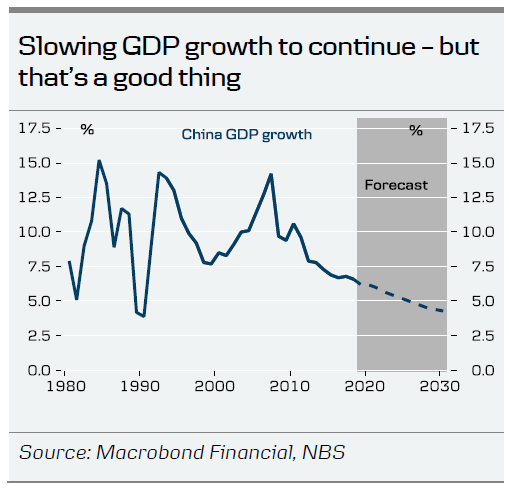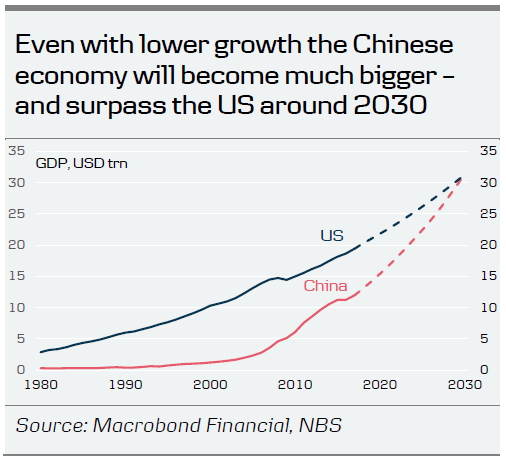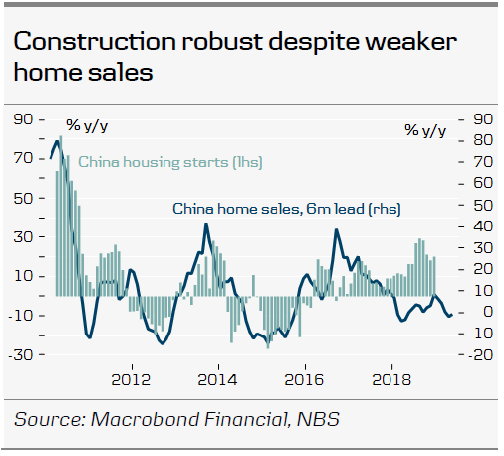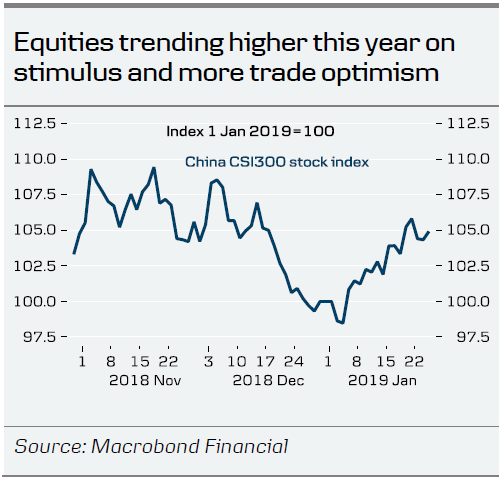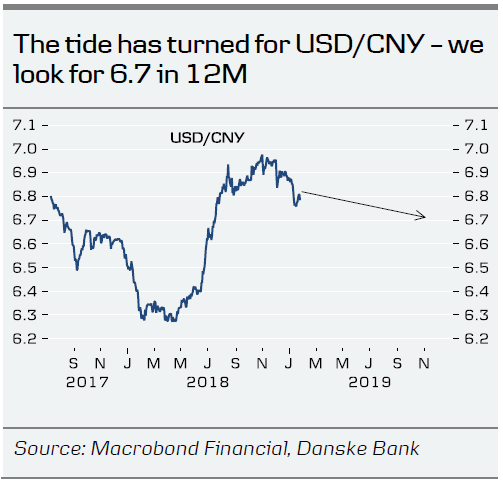- Trade talks enter crucial stage – our base case is still deal by end-Q2
- GDP growth slows – but construction and infrastructure provide support
- Xi Jinping warns of rising risks at seminar for top officials
Liu He heading big delegation for decisive trade talks in the US
After a long period of mostly positive comments on the trade talks, this week we saw more mixed signals . Commerce Secretary Wilbur Ross said to CNBC on 24 January that the US and China were ‘M iles and miles’ away from a trade deal and struck a less positive tone than other US trade officials recently. However, Trump on Wednesday said ‘I like where we are right now’ and ‘we’ll see what happens but we are doing very well in our negotiations with China’ , see Reuters 23 January. On Thursday night Treasury Secretary Stephen Mnuchin, who is seen as one of the softer US voices, stated that the US and China were making ‘a lot of progress’, see CNBC 24 January.
China this week confirmed that its top negotiator Liu He will head a large delegation to Washington for top-level trade talks on Wednesday and Thursday next week. Bloomberg , 25 January, also reported that a delegation of deputy ministers will come on Monday to prepare for the talks with US counterparts.
Comment. After initial talks centred on the ‘easy’ parts related to which US goods China can buy, we are now entering the stage when the difficult structural issues are on the agenda and that is why the top people are coming to the table. These thorny issues concern China’s industrial policy (Made in China 2025), protection of intellectual property rights (IPR), forced technology transfer and non-tariff barriers. China has already taken steps on some of these issues. For example, it put forward a draft law in December that significantly increases the fines for infringement of IPR (see Strait Times , 25 December). However, there will also be a limit to the scale of the changes that China will make to their strategy of state-led development.
A separate issue in the talks is enforcement where the US wants specific sanctions written into a deal if China does not fulfil it, Bloomberg 7 January. In our view, China is likely to want to limit this as it sees it as ‘humiliating’. The history of a range of humiliating unequal treaties following the Opium Wars in the 19 th century is part of Chinese memory.
Our base case remains that China will offer enough for Trump to take a deal, even though China will not meet all demands within the structural issues. Trump will likely fight another war in the tech area instead, where we expect significant restrictions on US exports of technology to China and on Chinese investments in the US. We put a probability of 75% for a trade deal by the end of Q2. We see the 2020 Presidential election as a key motivation for this, as Trump probably wants a strong economy, strong markets and a deal with China before he goes on the campaign trail to convince US voters to re-elect him.
Weakest growth since 1990 – but that’s how it should be
Chinese Q4 GDP growth fell as expected to 6.4% y/y taking the annual growth rate for 2018 to 6.6% down from 6.8% in 2017. That is the lowest growth rate since 1990. Releases this week for industrial production and retail sales for December showed small upside surprises. It followed very weak readings in November, though.
Comment. Many news headlines focused on the fact that growth for 2018 was the weakest since 1990. However, that headline can hopefully be made for many years ahead as China’s structural growth rate is now declining. This is perfectly normal at this stage of the catching up and was the case in South Korea, Taiwan and Japan during their catch-up phases. It is also a sign that China is putting more focus on quality over quantity. We expect growth over the next decade to decline gradually and average 5% from 2020-30 (see top chart on page 1). However, it will still lead to a rise in GDP to around USD32trn in 2030 from the level in 2018 of USD13trn. 2030 is also the year in which we expect Chinese GDP (in market prices) to surpass US GDP.
When looking at the current cyclical picture, though, there is no doubt that China is now facing a downturn, which we believe will continue into Q1 as the trade war bites further. However, we expect activity to grind higher from Q2 driven by stimulus, robust construction (see top chart) and a trade deal between US and China. If we are right, we should also see a gradual improvement in the global business cycle from Q2 as China is the epicentre of the current global slowdown. That in turn should drive stronger equity markets globally – not least in China and Emerging Markets.
Xi Jinping warns over rising risks
On Monday, Xi Jinping hosted a study session at the Party School of the Communist Party that focused on rising risks to China. According to Xinhua Xi ‘told senior officials to strengthen their ability in preventing and defusing major risks to ensure sustained and healthy economic development and social stability‘. In his speech Xi ‘analyzed and raised specific requirements on the prevention and defusion of major risks in areas including politics, ideology, economy, science and technology, society, the external environment and Party building‘. The study session was attended by China’s top leaders across the country and lasted a full four days, see also SCMP 24 January.
Comment. The seminar highlights that China sees risks on many fronts currently – not least the economy, international relations, security, but also ideology. The seminar highlighted that ‘prority should be given to strengthening the ideological and political education among the young, building up their full confidence in the path, theory and system‘. There is a rising concern among Chinese leaders, that the US will increasingly work to undermine the Chinese model. This has been advocated by American China researcher at the Hudson Institute Michael Pillsbury, who has been called the leading authority on China by Trump. In Pillsbury’s book ‘The Hundred-Year Marathon’ from 2015, he writes that the US should be ‘reviving the support for democratic and civil society groups within China‘.
Other news of the week
Chinese stock markets were treading water somewhat this week but are still on an upward trend so far this year (see chart).
China is now among the most innovative countries in the world according to Bloomberg Index, see Bloomberg 22 January.
The US confirms it is still seeking the extradition of Huawei CFO, SCMP 22 January.

